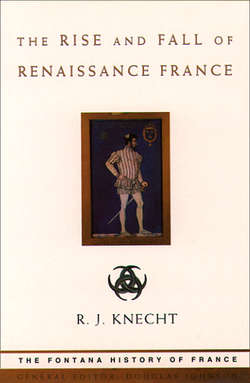Читать книгу The Rise and Fall of Renaissance France - R. Knecht J. - Страница 51
Guillaume Budé
ОглавлениеIn 1497, Lefèvre’s circle of friends and disciples at the collège du cardinal Lemoine was joined by Guillaume Budé. He belonged to a family of the well-to-do Parisian bourgeoisie, which over three generations had risen to the highest offices in the royal chancery. About 1483 he had been sent to study civil law at Orléans. On returning to the capital he seemed only interested in hunting and other pleasures, but in 1491 he became disgusted with his way of life. Resuming his studies, he began to learn Greek. He also got to know Andrelini, who in 1496 dedicated a work to him. Even after becoming a royal secretary in 1497, Budé continued to read classical and patristic texts. He translated some works of Plutarch, dedicating one to Pope Julius II.
In November 1508, Budé published his Annotations on the Pandects which laid down the principle that Roman law can only be understood through the study of Roman history, literature and classical philology. It was also a scathing attack on scholastic jurisprudence as represented by the work of Accursius and Bartolus. Using both philology and history, Budé undermined their assumption that the Corpus Iuris was an authoritative system of law adaptable to the needs of all time. The effect of this onslaught on current legal thinking was comparable to that on theology of Valla’s exposure of the ‘Donation of Constantine’ (a document fabricated in the 8th–9th century to strengthen the power of the Holy See). Yet Budé was more interested in restoring the text of Justinian’s Digest as literature than in using it for legal education and practice. His polemic against contemporary jurisprudence was the first of many similar legal works of the sixteenth century, the best known being Rabelais’s caricature of legal terminology and practice. Almost the entire legal profession was attacked by Budé. He accused its members of using the law not to establish equity or justice but simply to sell and prostitute their words. Deploring the lack of public spirit among his compatriots and the loss of ancient virtues, he expressed the hope that a revival of letters would reawaken their consciences. A theme which assumed importance in Budé’s later work – his absolutist theory of the state – was already present in his Annotations. While refuting Accursius, he showed the invalidity of equating the parlement with the Roman senate.
The Annotations was France’s first great work of philology and its impact, notably on Alciati’s teaching of law at the University of Bourges, was considerable. Budé followed Valla in his use of a philological-historical method and in his opposition to the Bartolists, but he went further by reviving the Aristotelian concept of equity. This was to have a lasting effect on legal practice in France and elsewhere. Budé’s scholarship, though profound, was long-winded and undisciplined. His De Asse (1515), a treatise on ancient coinage, is full of absurdly patriotic digressions in which he seeks to elevate Paris above Athens as a centre of ancient learning.
Like Lefèvre d’Etaples, Budé repudiated the vocabulary and methodology of the schoolmen and wanted Christianity to rest solely on the correct study of Scripture. But he did not share Lefèvre’s mysticism. He despised devotions that were purely formal or smacked of superstition. He equated Christianity with obedience to Christ’s commands and the imitation of His life on earth. As a scholar Budé was well aware of errors in the Latin Vulgate and favoured a return to the original Greek text of the New Testament. His objective was to revivify religion by uniting the Christian faith and humanism. His admiration for the classics did not persuade him that compromise was possible between Hellenism and Christianity. Given the choice, he preferred the latter and in his last work, De transitu Hellenismi ad Christianismum, he even denied the value of ancient philosophy.
